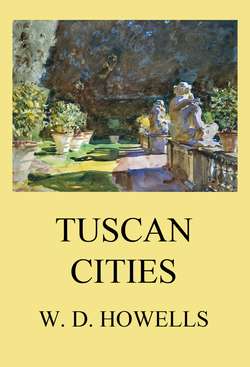Читать книгу Tuscan Cities - William Dean Howells - Страница 23
На сайте Литреса книга снята с продажи.
XX
ОглавлениеAfter I had been at Careggi, I had to go again and look at San Marco, at the cell to which Savonarola returned from that deathbed, sorrowing. Yet, at this distance of time and place, one must needs wonder a little why one is so pitiless to Lorenzo, so devoted to Savonarola. I have a suspicion, which I own with shame and reluctance, that I should have liked Lorenzo's company much better, and that I, too, should have felt to its last sweetness the charm of his manner. I confess that I think I should have been bored — it is well to be honest with one's self in all things — by the menaces and mystery of Savonarola's prophesying, and that I should have thought his crusade against the pomps and vanities of Florence a vulgar and ridiculous business. He and his monks would have been terribly dull companions for one of my make within their convent; and when they came out and danced in a ring with his male and female devotees in the square before the church, I should have liked them no better than so many soldiers of the Army of Salvation. That is not my idea of the way in which the souls of men are to be purified and elevated, or their thoughts turned to God. Puerility and vulgarity of a sort to set one's teeth on edge marked the excesses which Savonarola permitted in his followers; and if he could have realized his puritanic republic, it would have been one of the heaviest yokes about the neck of poor human nature that have ever burdened it. For the reality would have been totally different from the ideal. So far as we can understand, the popular conception of Savonarola's doctrine was something as gross as Army-of-Salvationism, as wild and sensuous as backwoods Wesleyism, as fantastic, as spiritually arrogant as primitive Quakerism, as bleak and grim as militant Puritanism. We must face these facts, and the fact that Savonarola, though a Puritan, was no Protestant at all, but the most devout of Catholics, even while he defied the Pope. He was a sublime and eloquent preacher, a genius inspired to ecstasy with the beauty of holiness; but perhaps — perhaps! — Lorenzo knew the Florentines better than he when he turned his face away and died unshriven rather than give them back their freedom. Then why, now that they have both been dust for four hundred years — and in all things the change is such that if not a new heaven there is a new earth since their day — why do we cling tenderly, devoutly, to the strange, frenzied apostle of the Impossible, and turn, abhorring, from that gay, accomplished, charming, wise, and erudite statesman who knew what men were so much better? There is nothing of Savonarola now but the memory of his purpose, nothing of Lorenzo but the memory of his; and now we see, far more clearly than if the frate
